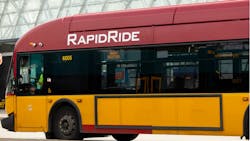Federal grants provide boost to King County Metro’s coming RapidRide projects
Two future King County Metro Transit (King County Metro) RapidRide lines have been recommended for federal funding by the Federal Transit Administration (FTA), paving the way for the arrival of frequent and reliable bus service in two of the busiest travel corridors in King County.
The funding is for the RapidRide I line, which will travel between Renton, Kent, and Auburn, and is one of the most heavily used routes in South King County; and the RapidRide J Line, which will go through several of Seattle’s fastest-growing neighborhoods, including South Lake Union, Eastlake, and the University District.
The FTA is recommending $60 million in funds for the RapidRide J line, which will upgrade and replace the current Metro route 70, which connects the University District to Downtown Seattle via Eastlake and South Lake Union. The funds for the J Line come from the FTA’s Capital Investment Grants (CIG) Program and Expedited Project Delivery (EPD) Pilot Program.
RapidRide J Line is scheduled to begin service in 2026 and is a collaboration between King County Metro and the city of Seattle. The J Line is part of the city’s Transportation Master Plan, with funding provided by the voter-approved Move Seattle Levy as well as funds from the FTA. Seattle will lead the construction of the capital improvements for the J Line, while King County will own, operate and maintain the J Line vehicles and service.
“The RapidRide J Line will replace Route 70, which has become a lifeline for students going to the University of Washington and a vital link connecting downtown to the growing neighborhoods of South Lake Union and Eastlake,” said King County Metro General Manager Terry White. “This recommended grant will expand access to education and jobs for communities across King County.”
The RapidRide I Line is being recommended for $66 million. In response to community input, the I line, scheduled to begin service in 2025, will upgrade Route 160. The I Line is part of the Renton, Kent, Auburn Area Mobility Project (RKAAMP), which first upgraded bus service in 2020 to provide greater access to employment centers for the growing communities in south King County.
RapidRide lines boast increased frequency and reliability, onboard Wi-Fi, larger and well-lit branded shelters and real-time bus arrival information. Some RapidRide bus stations have ORCA readers so cardholders can pay before boarding and can then enter through any of the distinctive red buses’ three doors. King County Metro currently operates six RapidRide lines throughout King County.
The proposed grants are awaiting final action from Congress.
